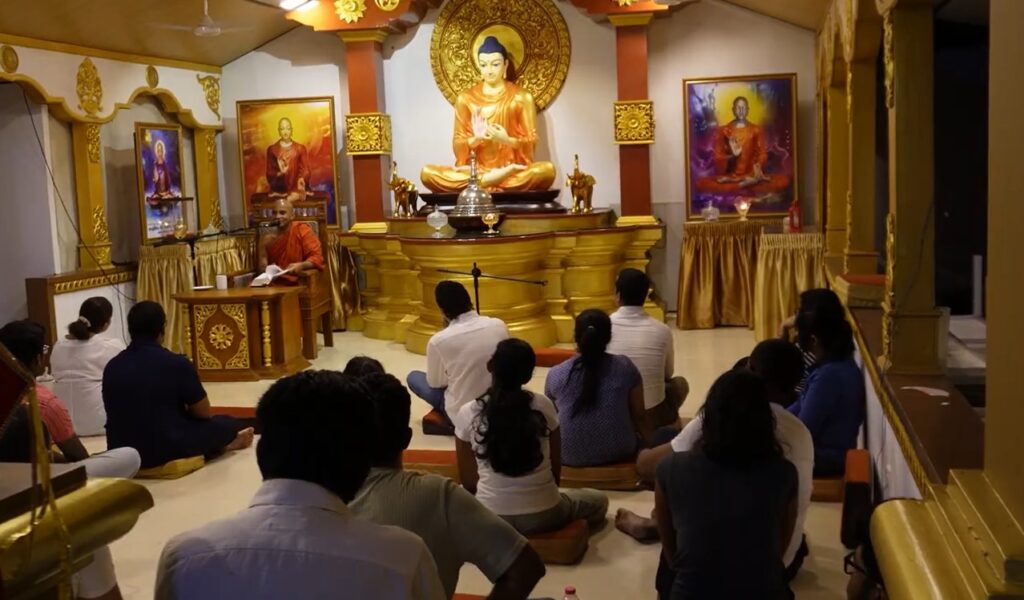
Yesterday, during the Meditate With a Monk programme, we learned how to remove our anger towards various people. We also learned that it is possible to remove our anger and resentment towards even our worst enemy and that it is only harmful to us, when we bear hatred and resentment. Arahant Sariputta teaches the five types of people we have resentment towards and the way to remove that resentment.
1️⃣ The first type of person’s bodily behaviour is impure, but speech is pure. For such a person, we can recall their good speech. This is just like how a monk wearing rag robes sees a rag by the side of the road. They’d hold it down with their left foot, spread it out with their right foot, tear out what was still intact, and take it away with them.
In the same way, you should ignore that person’s impure behaviour by way of body and instead focus on their pure speech. That is how you get rid of resentment for that person.
2️⃣ The second type of person’s speech is impure, but their bodily behaviour is pure. For this type of person, we can recall the good actions they do with their body. Suppose there was a lotus pond covered with moss and aquatic plants. Then a person struggling in the heat, weary, thirsty, and parched, would see this pond, sweep the moss and aquatic plants, drink from their cupped hands, and then leave.
Similarly, you should ignore that person’s impure speech and focus on their pure bodily actions. That’s how you get rid of resentment for that person.
3️⃣ The third type of person’s bodily behaviour is impure, and their speech is impure, but from time to time, this person does acts of merit. So, for this type of person, we could focus on the good actions they do from time to time. Suppose there was a little water in a cow’s hoofprint. Then along comes a person struggling in the heat, tired, thirsty, and parched. They might think, ‘This little bit of water is in a cow’s hoofprint. If I drink it with my cupped hands or in a bowl, I’ll stir it and disturb it, making it undrinkable. Why don’t I get down on all fours and drink it up like a cow, then be on my way?’ So that’s what they do.
Similarly, you should ignore that person’s impure behaviour by way of speech and body, and focus on the fact that they gain openness and clarity of heart from time to time. That’s how to get rid of resentment towards that person.
4️⃣ The fourth type of person’s bodily behaviour and speech are impure, and they do nothing good. So, for this type of person, we can develop compassion, and if we get angry towards this person, we can think that they helped us to see our anger.
Suppose a person was travelling along a road, and they were sick. And they’re stranded; there’s not a single village nearby. Then a person travelling along the road sees them and thinks of them with nothing but compassion, kindness, and sympathy: ‘Oh, may this person get suitable food or medicine, or a competent carer, or someone to bring them to the village. Why is that? So that they don’t come to ruin right here.’
In the same way, you should ignore that person’s impure behaviour by way of speech and body and think of them with nothing but compassion, kindness, and sympathy: ‘Oh, may this person give up bad conduct by way of body, speech, and mind and develop good conduct by way of body, speech, and mind. Why is that? So that, when their body breaks up after death, they’re not reborn in a place of loss, a bad place, the underworld, hell.’ That’s how to get rid of resentment towards that person.
5️⃣ And then there is a fifth person; this person’s bodily behaviour and speech are pure. The Buddha explains that even with such a person, you can get angry. This person is just like a lotus in a pond.
Suppose there was a lotus pond with clear, sweet, cool water, clean banks, pleasant surroundings, and was shaded by many trees. Then along comes a person struggling in the heat, weary, thirsty, and parched. They’d dive into the lotus pond to bathe and drink. And after emerging, they’d sit or lie down right there in the shade of the trees.
Similarly, you should focus on that person’s pure behaviour through their body, and speech. That’s how to get rid of resentment towards that person.
As we observe our mind in this way, our right view, right mindfulness, and loving kindness (right intention) develop, and because of our effort to abandon defilements, we also develop in right effort. By cultivating positive qualities in ourselves and focusing on the good in others, we can gradually let go of our resentment. This practice will help us deal with anyone we meet in our lives. We will start to see that everyone has a good quality and that everyone deserves compassion. This, in turn, will not only benefit our mental well-being but also strengthen our relationships with those around us.
Theruwansaranie Namo Buddhaya!